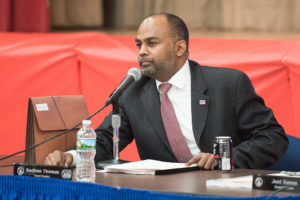Speaking of administrative salaries, NJ Spotlight reports today that the NJ State Auditor has released a report that says “at least some of the state’s nearly 200 private special-needs schools – which are funded by public schools that send students to them — pay exorbitant salaries to their top administrators and that the state has done little to rein in those salaries.” (Go to Spotlight link for Auditor’s Report.)
There are other findings in the Auditor’s report that point to a lack of state oversight: failure to collect available Medicaid money, inadequate fiscal reviews, inadequate criminal background checks and employee certification, and a few really glaring instances of nepotism.
New Jersey supports an atypically high number of private special education schools: 8% of children classified with disabilities attend them, or 15,000 kids, the highest proportion in the country. Tuition is paid by local districts and state aid, as per Federal law. The lack of oversight, specifically over tuition and salaries, is not news. The Christie Administration’s Education Transformation Task Force Final Report in September of 2012 (see page 141, for example) describes at length the lack of logic in setting annual tuition, discrepancies between private special ed school salaries and public special ed salaries, and acknowledges the DOE’s inability to manage the problem. For example:
[T]he demands of an effective review and reconciliation of rates for every PSSD [private schools for students with disabilities] strains the capacity of the Department’s finance staff. Finally, this process has led to ill-will among the parties involved. Taxpayers are suspicious that PSSDs are deliberately and artificially increasing their costs; PSSDs are suspicious that they have been targeted for extreme scrutiny and have been given an automatic presumption of dishonesty; and school districts are made party to a payment system over which they have little control and that almost always results in districts ultimately having to pay large amounts to PSSDs for underpayment of tuition.
Today’s NJ Spotlight focuses on administrative salaries: “For instance, the report said one school with just 110 students pays each of two directors $225,734 a year, the maximum allowed for the private schools under state regulations. Forty-four directors at 32 schools were making more than the $175,000 maximum for superintendents in public school districts, which was imposed by Gov. Chris Christie amid controversy three years ago. A total of “19 executive directors and/or directors at 13 schools, with an average enrollment of 200 students, made the maximum of $225,734.”
Going back to the 2012 Task Force report, at an unspecified private special ed school a teacher made $153,204, a phys. Ed. Teacher made $149,803, and a librarian made $133,987. Who knows? Maybe they’re worth it. Maybe we grossly underpay our public special education staff. You think current student growth metrics are porous and squishy? Try determining adequate yearly progress for kids with disabilities.
At the least, publicly-funded private special education schools should be required to file the same sort of “user-friendly” budgets as public schools. That might shed a little light on funding and compensation issues.




1 Comment